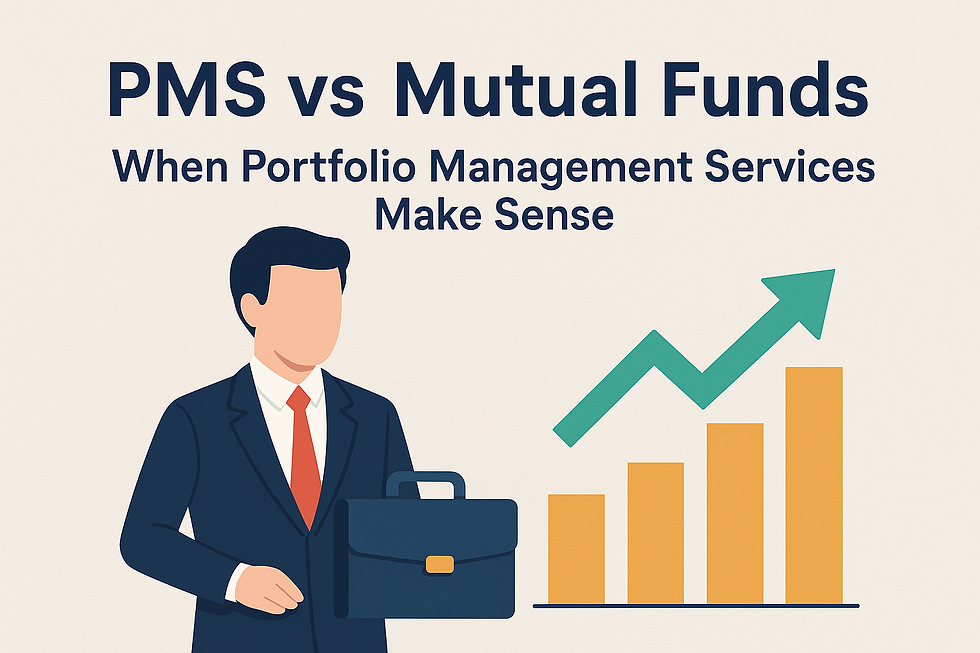When is PMS Better than a Mutual Fund?
- Otto Money

- Aug 5, 2025
- 3 min read

In our previous blog, we discussed how Mutual Funds are typically more tax-efficient than Portfolio Management Services (PMS). But tax is just one aspect of investing. There are situations where a PMS can be the better vehicle for participating in the equity markets - especially for investors looking for customization, flexibility, and portfolio control.
Let’s understand when PMS might be the better choice.
1. Avoid Buying Expensive Stocks
In a Mutual Fund, when you invest, you're buying into the existing portfolio - regardless of whether the fund’s current holdings are attractively priced. Even if a stock has already run up, you still buy it at the current market price.
PMSs, especially those that do not follow model portfolios, have an edge here. They build your portfolio from scratch, based on the valuation at the time of your investment.
Example:
A fund manager identifies Stock A at ₹100 and projects a target of ₹150 over 3 years - a 14.5% CAGR. After 1 year, the stock is trading at ₹125, reducing the future return to 9.5% CAGR. A Mutual Fund investor entering now buys Stock A at ₹125. In contrast, a PMS manager may skip buying it altogether, instead allocating to better-valued opportunities.
2. No “Run on the Fund” Risk
Mutual Funds, being pooled vehicles, are exposed to redemption pressure. A large outflow may force fund managers to sell holdings at inopportune times, especially in small-cap strategies with low liquidity.
PMS portfolios are individually managed. If someone else exits, it doesn’t impact your portfolio. The fund manager can hold or sell based on strategy, not liquidity pressure - particularly useful for concentrated or illiquid portfolios.
3. Access to Hedging Strategies
PMS managers can use derivatives and options to hedge against downside risks - a flexibility not available in Mutual Funds. This can be useful for clients looking to limit drawdowns, even at the expense of long-term returns.
However, be cautious. Hedging a small-cap PMS with Nifty options may not be effective - index hedges don’t always protect against small-cap volatility.
4. More Concentrated Bets for Higher Risk-Reward
Mutual Funds must follow SEBI-imposed diversification rules, limiting exposure to single stocks or sectors. While this ensures stability, it can also dilute high-conviction ideas.
Some PMSs are designed to take concentrated positions, which can yield outsized returns - if the calls are right. We do not recommend this as a standalone strategy, but for clients with a well-diversified Mutual Fund core, a high-conviction PMS can act as a satellite allocation to potentially enhance returns.
5. Tax Residency Matters
For Indian residents, Mutual Funds are generally more tax-efficient due to lower capital gains tax rates and tax-deferred growth.
However, for US citizens or residents, it’s a different story. Mutual Funds are classified as PFICs (Passive Foreign Investment Companies) and taxed at marginal income tax rates - up to 37% on an accrual basis.
A PMS, on the other hand, may issue a K-1 equivalent certificate, allowing gains to be taxed as long-term capital gains at 20% under US rules. In such cases, PMS is often the more tax-efficient choice.

Final Thoughts
PMSs are not for everyone, and not all PMSs are created equal. Selecting the right one requires deep diligence and alignment with your risk profile and return expectations.
As of June 2025, there are over 1,000 equity PMS strategies in India but only a select few meet our standards for inclusion in client portfolios.
Before making a decision, always consult your financial advisor to evaluate whether PMS is the right fit for you and how much of your portfolio should be allocated to it. You can always contact us by emailing advisory@wealthbeacon.ai .



Comments